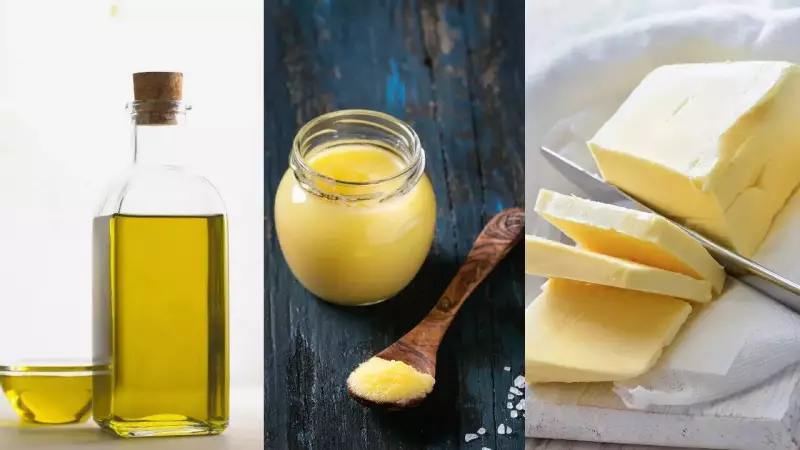
Fats play an indispensable role in our daily diet, serving as a crucial energy source, aiding hormone production, and facilitating the absorption of essential vitamins. However, the nutritional landscape of fats is far from uniform. Common kitchen staples like oil, ghee, and butter each present a unique profile of flavour, nutritional benefits, and potential health implications. While traditional Indian cooking often celebrates ghee and butter for their rich taste, modern dietary trends are shifting towards plant-based oils. Your choice between them should align with your specific health objectives, cooking methods, and cultural preferences.
Nutritional Breakdown: Ghee, Butter, and Oil
Ghee, also known as clarified butter, is produced by heating butter to eliminate milk solids and water, resulting in a pure fat. It is rich in saturated fats and contains fat-soluble vitamins A, D, E, and K. A key differentiator for ghee is the presence of butyric acid, a short-chain fatty acid linked to improved gut health, and conjugated linoleic acid (CLA), which may boost metabolism and immunity.
Butter is created by churning cream and retains fat along with small quantities of water and milk solids. It comprises roughly 80% fat, predominantly saturated, and provides vitamins A and D. However, its content of cholesterol and lactose makes it a less suitable option for individuals who are lactose intolerant or managing heart conditions.
Oils derived from vegetables and seeds, such as olive, sunflower, mustard, and coconut oil, exhibit diverse fat compositions. Olive oil and mustard oil are high in heart-healthy monounsaturated fats. Sunflower and soybean oils contain polyunsaturated fats, which are beneficial in moderation. Interestingly, coconut oil, despite being plant-based, is high in saturated fat, similar to ghee and butter.
Cooking Performance and Health Impacts
The smoke point of a fat—the temperature at which it starts to break down—is a critical factor for cooking. Ghee boasts high heat stability, making it excellent for frying, sautéing, and traditional Indian deep-frying. Butter, with its milk solids, burns easily and is better suited for baking and low-heat applications. Refined vegetable oils perform well at high temperatures but can lose nutritional value during processing.
From a health perspective, oils like olive, mustard, and canola, with their unsaturated fats, are champions for heart health, helping to lower bad cholesterol (LDL) and raise good cholesterol (HDL). Ghee, consumed in moderation, may also support HDL levels, but its saturated fat content warrants caution for those with cardiovascular risks. Butter, with higher cholesterol and saturated fat than ghee, is best used sparingly.
For digestive wellness, ghee's butyric acid supports the gut lining and may reduce inflammation. Butter offers minor amounts, while refined oils lack this advantage. All three are calorie-dense, providing about 9 calories per gram, but ghee and butter might promote satiety, potentially curbing overeating.
Making the Right Choice for Your Kitchen
The ideal fat for your diet hinges on your personal health goals and culinary habits. For optimal heart health, opt for oils like olive, mustard, or canola in moderation. A study referenced on PubMed even found that a diet rich in olive oil resulted in more favourable cardiovascular risk profiles compared to one with ghee.
For traditional flavour and digestive benefits, choose ghee in small quantities. Its nutty, aromatic profile is unparalleled in Indian curries and sweets. For baking and occasional richness, butter remains the go-to for its creamy texture. The key to a healthy diet is balance. Incorporating a variety of fats while monitoring total intake allows you to enjoy both flavour and nutrition without compromising your well-being.
Disclaimer: This article is for informational purposes only and should not be considered medical advice. Please consult a healthcare professional before making any significant changes to your diet.





